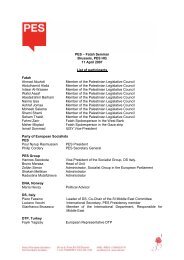Hedge funds and Private Equity - PES
Hedge funds and Private Equity - PES
Hedge funds and Private Equity - PES
You also want an ePaper? Increase the reach of your titles
YUMPU automatically turns print PDFs into web optimized ePapers that Google loves.
It goes without saying that effective monitoring of market abuse, asset assessment, accountability,<br />
early warning etc. is simply not possible without transparency.<br />
In his prize lecture (“Information <strong>and</strong> the change in the paradigm economics”, December 8, 2001)<br />
when receiving the Nobel prize in economics, Professor Joseph E. Stiglitz shows that information<br />
economics represents a fundamental change in the prevailing paradigm within economics.<br />
As we know from our economic history, the micro <strong>and</strong> macro economic theories have for years<br />
focused much more on the functioning of perfect market mechanisms’ than the imperfect<br />
markets, although we all know that in the real world, imperfect markets are more widespread.<br />
As Stiglitz underlines, the world is, of course, more complicated than our simple – or even more<br />
complicated – models would suggest. In the past couple of decades many major economic political<br />
debates have centred on the question: “The efficiency of the market economy <strong>and</strong> the<br />
appropriate relationship between the market <strong>and</strong> the government”. This debate has new importance<br />
considering the enormous influence on the financial markets of the hedge fund industry<br />
<strong>and</strong> private equity <strong>funds</strong>.<br />
In his Nobel prize lecture Stiglitz makes observations highly relevant to our study of the development<br />
of the modern financial markets:<br />
In a section on “The theory of corporate finance”, he says,<br />
“Under the older, perfect information theory, it made no difference whether firms raised capital<br />
by debt or equity, in the absence of tax distortions. This was the central insight of the<br />
Modigliani-Miller theorem. We have noted how the willingness to hold (or to sell) shares<br />
conveys information, so that how firms raise capital does make a difference. Firms rely heavily<br />
on debt finance, <strong>and</strong> bankruptcy, resulting from the failure to meet debt obligations, matters.<br />
Both because of the cost of bankruptcies <strong>and</strong> limitations in the design of managerial incentive<br />
schemes, firms act in a risk averse manner – with the risk being more than just correlation<br />
with the business cycle.<br />
Moreover, with credit rationing (or the potential of credit rationing) not only does the firm’s<br />
net worth (the market value of its assets) matter, but so does its asset structure, including its<br />
liquidity. While there are many implications of the theory of the risk averse firm facing credit<br />
rationing, some of which are elaborated upon in the next section, one example should suffice<br />
to highlight the importance of these ideas.”<br />
Corporate governance:<br />
“In the traditional theory, firms simply maximised the expected present discounted value of<br />
profits (which equalled market value) <strong>and</strong> with perfect information, how that was to be done<br />
was simply an engineering problem. Disagreements about what the firm should do were of<br />
little moment. In that context, corporate governance – how firm decisions were made –<br />
mattered little as well. But again, in reality, corporate governance matters a great deal. There<br />
are disagreements about what the firm should do – partly motivated by differences in judgements,<br />
partly motivated by differences in objectives. Managers can take actions which<br />
advance their interests at the expense of that of shareholders, <strong>and</strong> majority shareholders can<br />
advance their interests at the expense of minority shareholders. The owners not only could<br />
not monitor their workers <strong>and</strong> managers, because of asymmetries of information, they typically<br />
did not even know what these people who were supposed to be acting on their behalf<br />
should do. That there were important consequences for the theory of the firm of the separation<br />
of ownership <strong>and</strong> control had earlier been noted by Berle <strong>and</strong> Means (1932)”<br />
Part I – <strong>Hedge</strong> <strong>funds</strong> <strong>and</strong> private equity <strong>funds</strong> – how they work<br />
55




